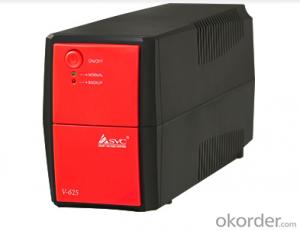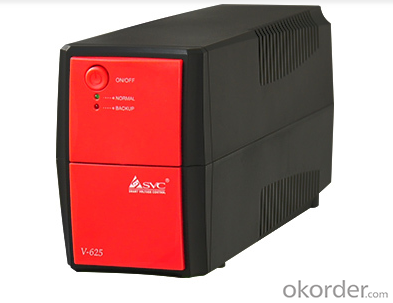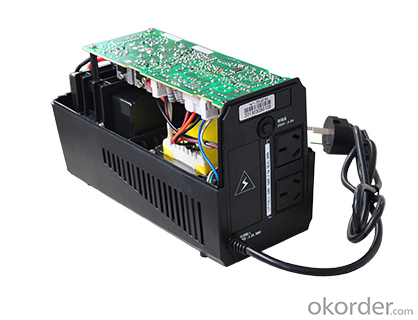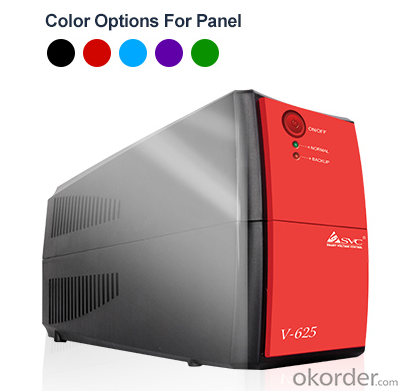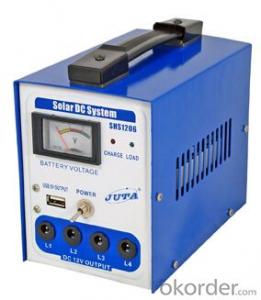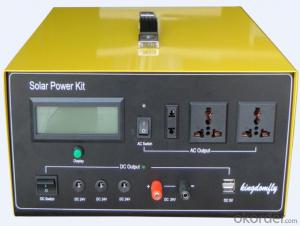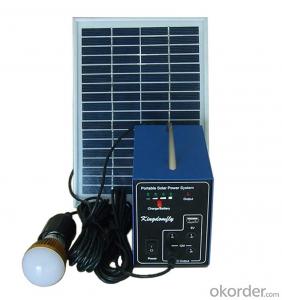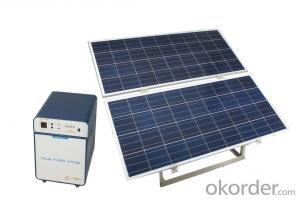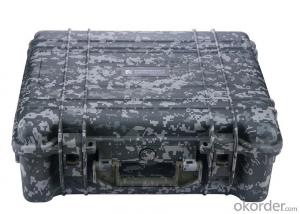Distributed Solar Energy Systems UPS Uninterrupted Power /12V Portable Electrical DC to AC UPS Uninterrupted Power Supply
- Loading Port:
- China main port
- Payment Terms:
- TT OR LC
- Min Order Qty:
- 20 carton
- Supply Capability:
- 10000 carton/month
OKorder Service Pledge
Quality Product, Order Online Tracking, Timely Delivery
OKorder Financial Service
Credit Rating, Credit Services, Credit Purchasing
You Might Also Like
12V Portable Electrical DC To AC UPS Uninterrupted Power Supply
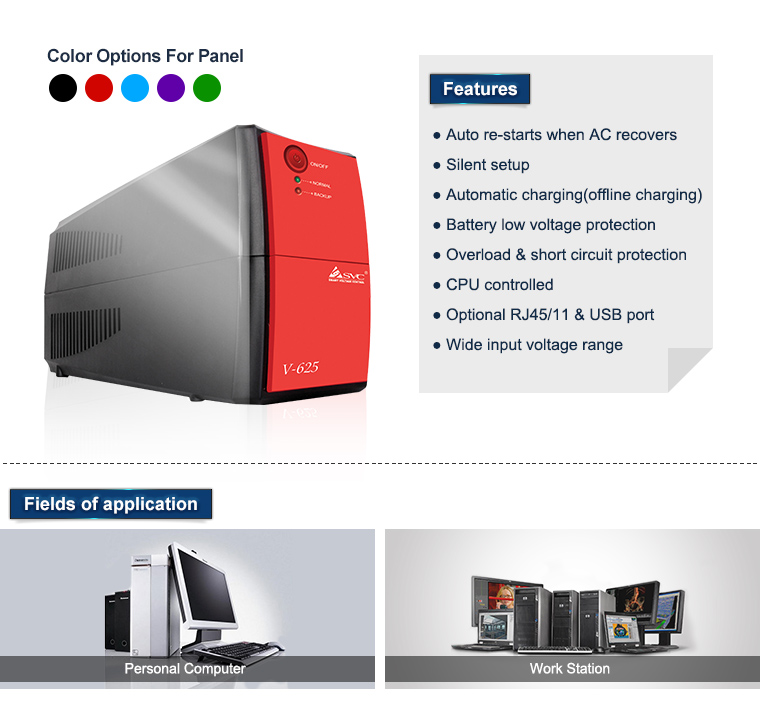

| Model | V-525 | V-625 |
| Capacity | 500va/300w | 600va/360w |
| INPUT | ||
| Input voltage | 110/120VAC or 220/230/240VAC | |
| Input voltage range | 90~132VAC / 175~265VAC | 85~150VAC / 145~290VAC |
| Frequency range | 60/50HZ/(Auto sensing) | |
| OUTPUT | ||
| Output voltage | 110/120VAC or 220/230/240VAC | |
| Output voltage range | 90~132VAC / 175~265VAC | 102~132VAC /200~255VAC |
| Output frequency | 60±0.5Hz or 50±0.5Hz(Batt. Mode) | |
| Output wave form | PWM(Batt. Mode) | |
| Transfer time | Typical 2-6ms, 10ms MAX / 2-6ms, 10ms | |
| BATTERY | ||
| QTY.&capacity of battery | 12V/4AH×1pc | 12V/7AH×1pc |
| Charging period | 4-6 hours recover to 90% capacity | |
| PROTECTION | ||
| Full protection | low voltage & overload & short circuit protection | |
| PHYSITAL | ||
| (kg) / Net weight (kg) | 4.5 | 5 |
| (mm) / Unit dimention (mm) | 255*98*140 | 300*95*140 |
| ENVIRONMENT | ||
| Environment of performance | Temperature 0°C~40°C, Humidity 20%~90% | |
| Noise level | Less than 40 dB | |
| MANAGEMENT | ||
| LCD or LED, RJ45/11 & USB | Optional | |

Feature:
Auto re-starts when AC recovers
Slience setup
Battery low voltage protection
Overload & short circuit protection
CPU control
Optional RJ45/11 & USB port
Wide input voltage range
Field of application
PC, Work stating
Small communication equipment
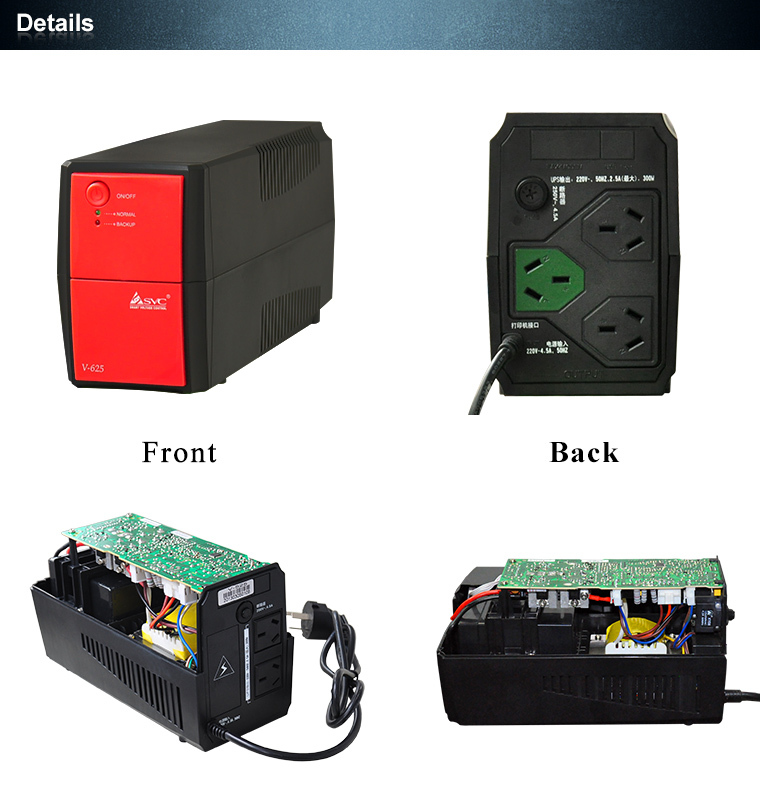
- Q: Can solar energy systems be used in areas with strict building codes or historical preservation restrictions?
- Indeed, it is possible to utilize solar energy systems in areas that have stringent building codes or restrictions on historical preservation. Although it may necessitate additional considerations and careful planning, integrating solar energy systems into the existing structures is certainly achievable. One approach to incorporating solar energy systems involves employing building-integrated photovoltaics (BIPV) or solar thermal systems that flawlessly blend into the building's design. These systems can be installed on rooftops, facades, or even utilized as shading elements, ensuring that the building's historical aesthetics or architectural integrity remain intact. Additionally, advancements in solar technology have facilitated the creation of more visually appealing solar panels, such as solar tiles or transparent solar windows, which harmonize with the building's existing materials. This simplifies the process of obtaining approval from historical preservation boards or building code authorities. It is crucial to note that in areas with strict building codes or historical preservation restrictions, the approval process for installing solar energy systems may be more complex. It may entail acquiring permits, conducting structural assessments, and closely collaborating with local authorities to ensure compliance with regulations. Nevertheless, due to the increasing recognition of the significance of renewable energy, many jurisdictions have established specific guidelines and provisions for integrating solar systems in historic areas. To summarize, it is feasible to utilize solar energy systems in areas with strict building codes or historical preservation restrictions by employing BIPV, solar thermal systems, or visually appealing solar panels. Although the approval process may require more effort, with proper planning and adherence to guidelines, it is possible to harness solar energy without compromising the architectural or historical significance of the area.
- Q: Are there any risks of electrical shocks during installation or maintenance of solar energy systems?
- Yes, there are risks of electrical shocks during the installation or maintenance of solar energy systems. Solar energy systems involve working with electrical components, including solar panels, inverters, and batteries, which can carry high voltage. If proper safety measures are not followed, it is possible to come into contact with live electrical parts and receive an electrical shock. Some common risks that can lead to electrical shocks include improper installation, inadequate training or knowledge of electrical systems, failure to use personal protective equipment (PPE), and lack of proper grounding. When installing or maintaining solar energy systems, it is crucial to follow safety guidelines and regulations, such as wearing insulated gloves, using insulated tools, and ensuring that the system is properly grounded. Additionally, working at heights during installation or maintenance poses an additional risk of electrical shocks. It is important to exercise caution to prevent falls or accidental contact with live electrical parts while working on rooftops or elevated areas. To mitigate the risks of electrical shocks, it is recommended to hire qualified and trained professionals for the installation and maintenance of solar energy systems. Regular inspections and maintenance checks should also be conducted to identify and address any potential electrical hazards. Overall, while solar energy systems offer numerous benefits, it is essential to be aware of the potential risks of electrical shocks and take necessary precautions to ensure the safety of individuals involved in the installation or maintenance process.
- Q: Can solar energy systems be used in areas with limited space?
- Yes, solar energy systems can be used in areas with limited space. There are various compact and space-efficient solar panels available, such as rooftop solar panels, solar awnings, and solar tiles, which can be installed in small areas. Additionally, advancements in technology have led to the development of flexible and portable solar panels that can be used in areas where traditional panels may not be suitable.
- Q: How can I find a reputable solar energy system installer?
- To find a reputable solar energy system installer, you can follow these steps: 1. Research and educate yourself: Begin by learning about solar energy systems, how they work, and the types of installations available. This will help you understand the basics and make informed decisions during the selection process. 2. Ask for recommendations: Reach out to friends, family, colleagues, or neighbors who have already installed solar systems. Inquire about their experience with the installer they hired, the quality of the work, and any potential issues or concerns they faced. Recommendations from trusted sources can be valuable in finding reputable installers. 3. Check credentials and certifications: Ensure that the installer you are considering has the necessary licenses, certifications, and insurance to carry out solar installations. Look for certifications from reputable organizations such as the North American Board of Certified Energy Practitioners (NABCEP) or the Solar Energy Industries Association (SEIA). 4. Research online reviews and ratings: Explore online review platforms, such as Google, Yelp, or Angie's List, to read customer reviews and ratings about different solar installers in your area. Pay attention to recurring positive or negative feedback and consider the overall reputation of the installer. 5. Obtain multiple quotes: Reach out to several solar installers and request detailed quotes for your specific project. Take note of the equipment they propose, warranties offered, pricing, and any additional services included. This will allow you to compare different installers and make an informed decision. 6. Ask for references and past projects: Request references from the installer to speak with previous customers about their experience. Inquire about the quality of work, timeliness, customer service, and any issues encountered. Additionally, ask the installer for examples of past projects they have completed to evaluate their workmanship and attention to detail. 7. Evaluate warranties and post-installation services: Inquire about the warranties provided by the installer for both the equipment and the installation work. A reputable installer will offer comprehensive warranties to ensure the longevity and performance of your solar system. Additionally, ask about any post-installation services they provide, such as maintenance, repairs, or monitoring. 8. Get multiple opinions: If you encounter any doubts or concerns during the selection process, don't hesitate to seek a second opinion from another reputable installer. This can help you gain further clarity and confidence in your decision. Remember, finding a reputable solar energy system installer is crucial for the long-term success and performance of your solar system. Take your time, do thorough research, and choose an installer that aligns with your needs, budget, and values.
- Q: Can solar energy systems be used in powering hotels or resorts?
- Yes, solar energy systems can certainly be used to power hotels or resorts. Solar power is a clean and renewable energy source that can provide ample electricity to meet the energy demands of hotels and resorts. These establishments typically require a significant amount of energy for various purposes such as lighting, heating, cooling, and operating electrical appliances and equipment. Installing solar panels on the rooftops or in open areas of hotels and resorts can allow them to harness the abundant sunlight and convert it into electricity. This electricity can be used to power the entire facility, reducing the reliance on traditional energy sources and lowering the carbon footprint. In addition to being environmentally friendly, solar energy systems can also provide financial benefits to hotels and resorts. By generating their own electricity, these establishments can reduce or even eliminate their utility bills, resulting in substantial cost savings over time. Moreover, some countries offer incentives, grants, or tax credits for implementing solar power systems, further enhancing the economic viability of such installations. Furthermore, the availability of solar energy is not limited to sunny days. With advancements in technology, solar panels can still generate electricity even during cloudy or overcast conditions. Additionally, excess energy produced during peak sunlight hours can be stored in batteries for later use, ensuring a consistent power supply throughout the day and night. By adopting solar energy systems, hotels and resorts can showcase their commitment to sustainability and environmental responsibility. This can be a valuable marketing tool, attracting eco-conscious guests who prefer environmentally friendly accommodations. It also aligns with the growing trend of sustainable tourism, which can enhance the reputation and competitiveness of these establishments in the industry. Overall, solar energy systems are a viable and efficient solution for powering hotels and resorts. They offer numerous benefits, including reduced utility costs, environmental sustainability, and enhanced market appeal. As the technology continues to evolve and become more affordable, more and more hotels and resorts are embracing solar power as a clean and reliable energy source.
- Q: Are there any risks of electrical shocks during installation or maintenance of solar energy systems?
- During the installation or maintenance of solar energy systems, one must be aware of the risks of electrical shocks. These systems involve working with electrical components, such as solar panels, inverters, and batteries, which carry high voltage. Failure to follow proper safety measures can result in contact with live electrical parts and the possibility of receiving an electrical shock. Several factors can contribute to the risk of electrical shocks, including improper installation, insufficient knowledge or training in electrical systems, failure to use personal protective equipment (PPE), and inadequate grounding. It is crucial to adhere to safety guidelines and regulations when installing or maintaining solar energy systems. This includes wearing insulated gloves, using insulated tools, and ensuring proper grounding. Furthermore, working at heights during installation or maintenance introduces an additional hazard of electrical shocks. Care must be taken to prevent falls or accidental contact with live electrical parts while working on rooftops or elevated areas. To minimize the risks of electrical shocks, it is advisable to hire qualified and trained professionals for the installation and maintenance of solar energy systems. Regular inspections and maintenance checks should also be conducted to identify and address any potential electrical hazards. In conclusion, while solar energy systems offer many benefits, it is vital to be aware of the potential risks of electrical shocks and take the necessary precautions to ensure the safety of individuals involved in the installation or maintenance process.
- Q: What is the role of solar energy systems in achieving energy independence?
- Solar energy systems play a crucial role in achieving energy independence by reducing reliance on traditional fossil fuel sources and providing a sustainable and renewable alternative. Solar power systems harness the energy from the sun and convert it into usable electricity, allowing individuals, communities, and even entire countries to generate their own power. One of the main advantages of solar energy systems is their ability to be installed almost anywhere, from residential rooftops to large-scale solar farms. This decentralization of power generation ensures that energy can be produced and consumed locally, reducing the need for long-distance transmission lines and minimizing transmission losses. By generating electricity on-site, solar energy systems contribute to energy independence by eliminating dependence on the grid and the associated costs and vulnerabilities associated with it. Solar energy systems also have a positive environmental impact. Unlike fossil fuels, solar power does not produce harmful emissions or contribute to climate change. By utilizing solar energy, countries can reduce their carbon footprint and work towards meeting their climate goals. Additionally, solar power systems can help reduce the need for environmentally damaging practices such as mining and drilling for fossil fuels. Moreover, solar energy systems contribute to energy independence by providing a stable and predictable source of energy. Unlike fossil fuels, which are subject to price fluctuations and geopolitical tensions, sunlight is readily available and free. By investing in solar energy systems, countries can reduce their vulnerability to energy price shocks and geopolitical dependencies, ensuring a stable and secure energy supply. Furthermore, solar energy systems promote economic growth and job creation. The installation, maintenance, and operation of solar power systems require a skilled workforce, leading to the creation of new jobs and economic opportunities. By investing in solar energy, countries can stimulate their local economies, reduce energy imports, and redirect energy spending towards domestic sources. In conclusion, solar energy systems are essential in achieving energy independence by reducing reliance on fossil fuels, promoting sustainability, offering stable and predictable energy sources, and contributing to economic growth. By embracing solar power, countries can not only secure their energy supply but also contribute to a cleaner and more sustainable future.
- Q: Can solar energy systems be used for powering electric vehicle solar charging parking lots?
- Yes, solar energy systems can be used to power electric vehicle solar charging parking lots. Solar panels can be installed on the parking lot's canopy or on nearby structures to generate electricity from sunlight. This clean and renewable energy can then be utilized to charge electric vehicles parked in the lot, reducing dependence on non-renewable energy sources and lowering carbon emissions associated with transportation.
- Q: How do solar energy systems impact the affordability of electricity?
- Solar energy systems can have a significant impact on the affordability of electricity. One of the main benefits of solar energy is that it provides a renewable and abundant source of power. By harnessing the sun's energy, solar systems can generate electricity without relying on fossil fuels, which are subject to price volatility and depletion. This stability in energy costs helps reduce the overall price of electricity. Additionally, solar energy systems can help homeowners and businesses save money on their utility bills. Once installed, solar panels produce electricity at no cost, reducing reliance on grid power and lowering monthly electricity expenses. In some cases, solar energy systems can even generate excess electricity that can be sold back to the grid, further offsetting costs. Moreover, solar energy systems often come with financial incentives and tax credits from governments and utility companies. These incentives can help lower the upfront costs of installing solar panels, making them more affordable for individuals and businesses. As solar technology continues to advance and become more efficient, the cost of equipment and installation has been steadily decreasing, making solar energy systems even more accessible. Overall, solar energy systems positively impact the affordability of electricity by providing a sustainable and cost-effective alternative to traditional power sources. By reducing dependence on fossil fuels, lowering energy bills, and offering financial incentives, solar energy systems play a crucial role in making electricity more affordable for both individuals and society as a whole.
- Q: Can solar energy systems be used for powering off-grid eco-lodges?
- Yes, solar energy systems can definitely be used for powering off-grid eco-lodges. Solar panels can be installed on the roofs of these lodges to capture sunlight and convert it into electricity. This renewable energy source can then power various electrical appliances, lighting, heating, and cooling systems within the lodges. By harnessing solar power, off-grid eco-lodges can operate sustainably and reduce their reliance on traditional grid electricity, leading to a more environmentally friendly and self-sufficient operation.
Send your message to us
Distributed Solar Energy Systems UPS Uninterrupted Power /12V Portable Electrical DC to AC UPS Uninterrupted Power Supply
- Loading Port:
- China main port
- Payment Terms:
- TT OR LC
- Min Order Qty:
- 20 carton
- Supply Capability:
- 10000 carton/month
OKorder Service Pledge
Quality Product, Order Online Tracking, Timely Delivery
OKorder Financial Service
Credit Rating, Credit Services, Credit Purchasing
Similar products
Hot products
Hot Searches
Related keywords
